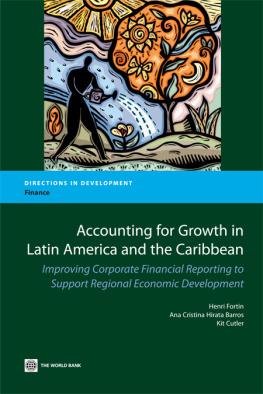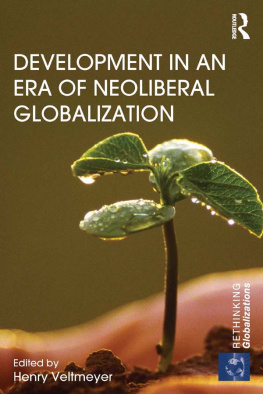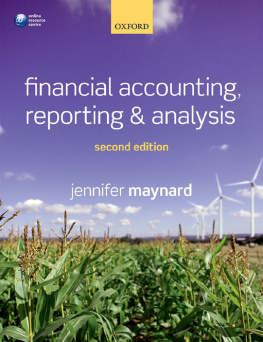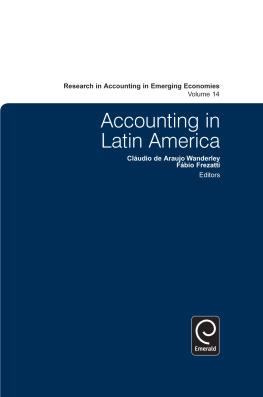Accounting for Growth in Latin America and the Caribbean
Accounting for Growth in Latin America and the Caribbean
Improving Corporate Financial Reporting to Support Regional Economic Development
Henri Fortin
Ana Cristina Hirata Barros
Kit Cutler

2010 The International Bank for Reconstruction and Development/The World Bank
1818 H Street, NW
Washington, DC 20433
Telephone: 202-473-1000
Internet: www.worldbank.org
E-mail:
All rights reserved
1 2 3 4 13 12 11 10
This volume is a product of the staff of the International Bank for Reconstruction and Development/The World Bank. The findings, interpretations, and conclusions expressed in this volume do not necessarily reflect the views of the Executive Directors of The World Bank or the governments they represent.
The World Bank does not guarantee the accuracy of the data included in this work. The boundaries, colors, denominations, and other information shown on any map in this work do not imply any judgement on the part of The World Bank concerning the legal status of any territory or the endorsement or acceptance of such boundaries.
Rights and Permissions
The material in this publication is copyrighted. Copying and/or transmitting portions or all of this work without permission may be a violation of applicable law. The International Bank for Reconstruction and Development/The World Bank encourages dissemination of its work and will normally grant permission to reproduce portions of the work promptly.
For permission to photocopy or reprint any part of this work, please send a request with complete information to the Copyright Clearance Center Inc., 222 Rosewood Drive, Danvers, MA 01923, USA; telephone: 978-750-8400; fax: 978-750-4470; Internet: www.copyright.com.
All other queries on rights and licenses, including subsidiary rights, should be addressed to the Office of the Publisher, The World Bank, 1818 H Street NW, Washington, DC 20433, USA; fax: 202-522-2422; e-mail: .
ISBN: 978-0-8213-8108-3
eISBN: 978-0-8213-8111-3
DOI: 10.1596/978-0-8213-8108-3
Library of Congress Cataloging-in-Publication Data
Accounting for growth in Latin America and the Caribbean : improving corporate financial reporting to support regional economic development / Henri Fortin, Ana Cristina Hirata Barros, Kit Cutler.
p. cm. (Directions in development)
Includes bibliographical references and index.
ISBN 978-0-8213-8108-3 ISBN 978-0-8213-8111-3 (electronic)
1. AccountingLatin America. 2. AccountingCaribbean Area. 3. CorporationsLatin AmericaAccounting. 4. CorporationsCaribbean AreaAccounting. 5. Economic developmentLatin America. 6. Economic developmentCaribbean Area. I. Fortin, Henri, 1964 II. Hirata Barros, Ana Cristina, 1973 III. Cutler, Kit, 1979
HF5616.L29A33 2009
657.098dc22
2009035880
Cover image by: Imagezoo/Images.com/Corbis.
Cover design: Naylor Design, Inc.
Foreword
Countries in Latin America and the Caribbean (LAC) are better positioned than in the past to realize their development potential. Since 2000, most countries in the region have tamed inflation, brought their external debt under control, and instituted more flexible exchange rate regimes. Domestic savings have contributed to financing rising investment while productivity gains have been an engine of growth in competitive sectors. In the past, external shocks spread quickly through much of the region, causing rapid currency devaluation and rising inflationand leaving the poor much worse off. But the region learned from past crises, and the most striking evidence of this newly gained resilience is LACs relatively better performance during the current global financial crisis compared with Eastern Europe and East Asia.
With countries such as Brazil and Mexico emerging as global players, the region is becoming part of the solution to global challenges ranging from the financial crisis to global climate change. This typically middle-income region managed to lift 60 million people from poverty between 2002 and 2008, a trend that is now threatened by the effects of the global crisis.
There is no model, nor a blueprint, that can signal a development path for the whole region. Within a diverse region, each nation is trying to find its own way to economic and social well-being. What is clear is that Latin Americans want a future that offers opportunities for all citizens, not only for a few.
To make this dream a reality, the region must modernize its infrastructure, improve the quality of the education system, enhance the business climate, and make the state work for the people by providing basic services to all citizens.
This book focuses on the role of strong and transparent accounting and auditing systems in supporting these objectives. They represent an essential building block for any strategy directed toward achieving shared growth. Financial institutions, investors, corporate managers, regulatory authorities, and policy makers rely on sound financial information to make informed decisions. Moreover, as the financial crisis has demonstrated, financial stability is crucial in maintaining confidence in the economic system and providing the right signals for a quick recovery. Financial transparency is critical for market discipline to work and regulatory oversight to be effective as well as to facilitate the regions reemergence as an attractive destination for investors, particularly in the aftermath of the current crisis.
The World Bank works with countries in the region to advance their own reform processes to design and align their local accounting and auditing processes with international codes and standards of good practice. After eight years of studying the current state of accounting and auditing in individual countries and providing technical assistance at the national level, we felt it was useful to take a step back and see what could be learned from a broader, regional analysis. This book started from that premise, and the approach has borne fruit. This publication not only provides regional policy makers the opportunity to see where their country leads and where it lags, but it also helps to prioritize the challenges ahead and to shape the corporate financial reporting policy agenda of the future.
Pamela Cox
Vice President
Latin America and Caribbean Region
World Bank
Preface
Professional accountants play a key role in todays world. Accounting expertise is critical to enable businesses, large or small, to manage their operations effectively, access finance, and make properly informed decisions on a broad range of activities (investing, launching new products, recruiting, mitigating operational risks, and so on).
Accountants working in the public sector help ensure that the peoples money is managed and spent efficiently, effectively, and transparently through strong country systems of public financial management. Accountants in state-owned enterprises help ensure that the companys ownersthat is, citizensget the best value from the enterprise. When acting as independent auditors, accountants uphold the public interest, and their work helps protect investors and other stakeholders.
Today, as global markets intertwine and financial innovations flourish, accounting and auditing have become ever more sophisticated. What was once largely a transaction-processing function, heavy on bookkeeping, is now a more analytic one. With the emergence of new, complex, and risky transactions, especially financial derivatives, new skills (such as risk-management consulting) have become necessary.










